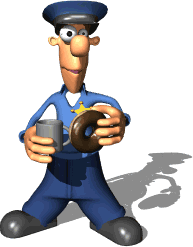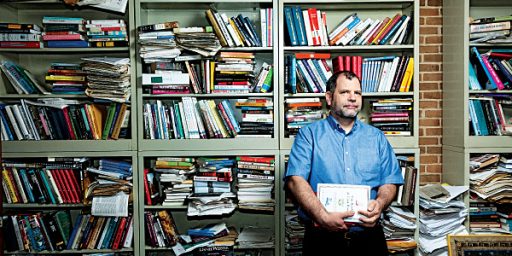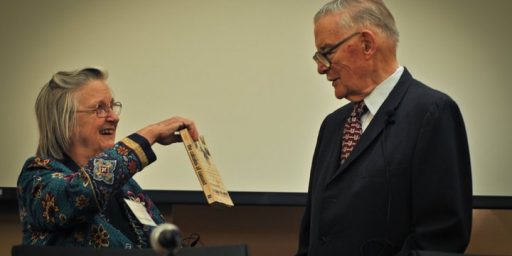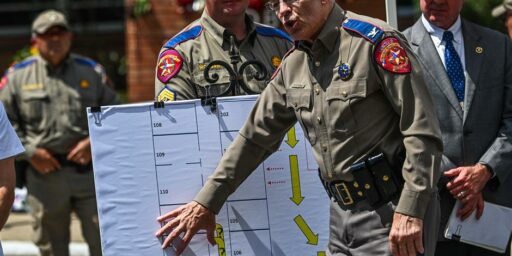Food Signaling
In separate posts, Tyler Cowen wonders why Heinz ketchup and Miller beer remain so much more popular in their home towns of Pittsburgh and Chicago* than elsewhere in the country and whether it’s a good sign if cops frequent a particular restaurant.
As to the first, he offers two competing alternatives: “Do area consumers develop the brand habit and pass it down across the generations? Or is the brand from a particular area better suited for people of that area in the first place, perhaps for reasons which are demographic or ethnic in nature and somewhat persistent through time?” I’d guess the former; people get used to brands and simply associate them with the product.
Since Cowen doesn’t see cops in the restaurants he likes, he figures they’re not a reliable quality indicator. But that’s a bit unfair. Presumably, cops eat in places that are 1) relatively inexpensive and 2) where they can get served quickly. Beat cops tend to make less money and have less schedule flexibility during their working hours than economics professors.
Tying the two stories together, I’m guessing cops don’t drink a lot of premium beer, either.
*Commenters are pointing out that Miller is based in Milwaukee. Cowen doesn’t assert otherwise, merely that it was introduced in Chicago quite early and remains popular there. I made it a “hometown” beer out of sentence parallelism rather than accuracy.
UPDATE: Dave Schuler notes that police officers make more than most of us think, pointing out that “a Chicago police officer starts in the middle income quintile and that many, many Chicago police officers are in the fourth or fifth income quintiles.” In follow-up discussion in his comments section, he adds some national figures:
According to the Bureau of Labor Statistics . . . the middle 50% earning from $35,600 and $59,880 with a median of $47,190 in local government.
Starting salary for a police officer in Washington, DC: $48, 715
Starting salary for a police officer in Alexandria, VA: $43,167
Then again, if the comparison is Tyler Cowen, I’d note that BLS figures for postsecondary eduction show that “The middle 50 percent earned between $39,610 and $80,390” The median salary for professors at American University (DC) is $93,850. At Cowen’s George Mason (Fairfax, VA), it’s $92,000.
So, I’m guessing your average full professor of economics is still dining more extravagently than your average uniformed policeman. But, no, cops aren’t relegated to fast food joints by virtue of their meager earnings.







Isn’t Miller a Milwaukee beer? I don’t think there’s been a major Chicago brewery for decades. The Goose Island microbrewery is the biggest.
Chicago??? Last I heard, Milwaukee was the home of the Miller brewing company.
There’s something a Chinese poet once said: “Patriotism consists in large part of the good things to eat one had as a child.” I think that tastes are formed fairly early, what’s familiar is often what’s considered good, and distribution of local products tends to be stronger.
If Tyler wants to see cops eat near his office on the George Mason campus, he should head over to the Chipotle on Lee Hwy near the intersection of Rt 50. I always see cops or firemen eat there with their cars and rigs parked outside.
You can frequently still tell how good a restaurant is by how many calendars it has hanging on its walls.
Old Style is the beer of Chicago; at least it was until the LaCross, WI based brewer sold out to Pabst.
This reminds me: I “grew up” drinking a lot of Pabst Blue Ribbon, as well as Lone Star. I didn’t like them then, and I don’t like them now.
Oh, and Pearl. Yech.
It’s also worth noting that Miller’s major market competitor is Anheuser-Busch, which is based in St. Louis.
Sports fans realize that there is a reason that the Chicago Bears and White Sox are one of the very few teams that don’t serve Anheuser-Busch beer. Call it persistence of rivalry.
Many joints also give cops free food to build up a rapport.
One other factor a cop buddy once told me: he liked to eat at places where he could see the food being made to insure he knew what he was ingesting. He assumed that people working in food service seemed to be overrepresented by ex-cons and troublemakers who may bear animosity towards the cops.
Triumph, you stole my words when addressing the restaurants that serve cops under the “friends and family” program. My informal analysis concludes the same thing here in Dallas-Fort Worth.
Boyd, that is probably the same reason I drink a lot of Shiner and Rahr beer (Fort Worth brewery) – because they’re part of the home team. Trust me, I don’t root for the Texas Rangers because of their winning tradition.
I think you may be missing an important angle here. It strikes me- and I have no proof- that a beat cop would want to eat in cheaper, more highly-trafficked cafes because keeping an eye on the community is his job. Hanging out in cheaper places could put him in closer proximity to a broader spectrum of the community. Everybody opts for cheap fast food now and then. It puts him in touch with the types of small business owners who are most often threatened and robbed, as well.
I am an Toronto Firefighter,we get free food all the time.